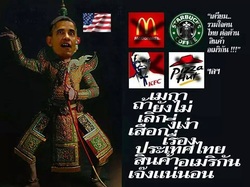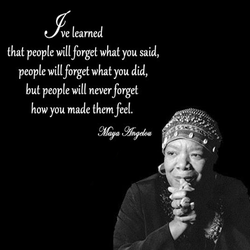|
On a list of the things we can’t do without, most people in the developed and enlightened West would not even mention an item that tops the list here in the East. I don’t mean by that that if you conducted a survey you’d find this mentioned most often. But if you studied what people did at the major intersections of their lives around here “calling for kwan” would come up very often. And if you ask anyone “What happens if your kwan leaves you?” they look at you suspiciously, shudder and say, “You die!” The very topic is taboo.
In the two dictionaries I depend on most, kwan is defined with long lists of options. They include such things as fortune, luck, auspiciousness, spirit, prosperity and charm. Yet it is one word. That means that it is all these various things in a single concept. I think we do not have an equivalent in English. That’s why it takes so many words to define it. My clue, however comes from Dr. George Bradley McFarland who spent decades collecting data for the first modern Thai-English dictionary. McFarland describes a rite of passage, now rare, in which a boy’s tonsure was cut. In the ceremony, an egg is provided for “the propitiation of the ‘Khuan’ ... of the tonsured. This surmounts the conical structures in the confirmation tonsorial ceremony and no doubt symbolizes the vital principle, and represents the idea of rebirth. As the candidate eats this [egg] it is evident the act signifies that the Khuan is reborn in his body and that he has entered upon a new life of prosperity, happiness and composure.” (p. 145) In another note McFarland writes about phuk kwan which involves placing “cords or threads strung with charms around the neck, wrists or ankles of infants or of the sick” which is intended “to ward off the power of evil spirits or to insure protection to the individual through propitiatory incantations or magical formulas and offerings.” These days, 70 years after McFarland got out of the Japanese concentration camp and finished his dictionary, the use of white cotton strings to communicate blessings and good wishes is very common, but amulets or charms are no longer usually added. Still later in his explanation, McFarland mentions that these rites “call back the protecting spirit.” I believe what French philosopher Henri Bergson called elan vital is fairly close to kwan. He said, “If there is finality in the world of life, it encompasses the whole of life in one indivisible embrace.” Bergson’s detractors translated elan vital as “life force” and sought to ridicule it as no more meaningful than “locomotive force” would be to describe how a locomotive on a train works. But they oversimplified Bergson’s complex concept, just as picking one of the many terms for kwan would deny the others. In any case, here in Northern Thailand a BAI SRI flower arrangement is one of the iconic symbols of important ceremonies. In the pictures accompanying this essay, our friend and neighbor, Prawit Rincome, is constructing a bai sri flower arrangement. These floral displays are more than decoration. They have a central role in marriage, supchataa [life extension], and ordination ceremonies. Their purpose, Prawit says, is to “call for kwan”. There are two basic types of bai sri arrangement. One is used with people, as part of the three human events mentioned. This type is built on 4 legs, or sprouts made of folded and plaited banana leaf. Each sprout traditionally had 9 points sticking out. The term for those points literally means “teats of a cat”. That gives this type its name, bai sri nom maew [cat teat bai sri]. The florist usually puts a white blossom or bud on each point. The whole arrangement involves taking buckets of flowers apart and re-assembling them. The other arrangement is similar but smaller and placed on a pedestal tray, used for inaugurating a spirit shrine. It is called bai sri thep [angel’s bai sri]. Here in the North a tradition is maintained that originated when His Majesty King Rama VI visited Chiang Mai in the second decade of the last century. This arrangement has 5 sprouts, rather than 4. At the tips a tuft of flowers indicates the royal person being honored. Yellow is the present King’s color, since he was born on Monday. The arrangements that Prawit is showing have not yet been completed with the symbolic rice and items that will fill the bowl. Bai sri flower arrangements are not prepared for funerals because the time for “calling for kwan” is over.
0 Comments
 The biennial General Assembly of the Presbyterian Church USA in Detroit this week (ending June 22) took action by a margin of 4 to 1 to permit pastors to perform same-sex marriages in jurisdictions where such marriages are legal. These marriages are governed by the same rules as other marriages. Namely, it is up to the pastor, guided by the Holy Spirit, to determine whether the marriage ought to be conducted; it is up to the session of the congregation to agree to the service; and it must be in the form of a worship service. This is not an uncontroversial stand the Presbyterian Church has taken. Furthermore, the General Assembly approved a proposal to change the definition of marriage from “between one man and one woman: to “traditionally between one man and one woman”. This has to be confirmed by the presbyteries over the next several months to be placed in the constitution of the Presbyterian Church USA. There was discussion about taking out the phrase entirely, but recognizing the long tradition was hoped to signal continuity rather than a radical break. This will not satisfy conservatives who insist that heterosexual monogamy is mandated by the Bible and is not open to change. Apparently the General Assembly was persuaded that Presbyterian Church USA policy must not be an obstacle for pastors to exercise pastoral care at the time a couple is embarking on marriage. Thus the Presbyterian Church joins a growing number of denominations who have yielded to the tide of openness to homosexuals as legitimate members of society. Perhaps it would be best to simply applaud what the General Assembly has bravely done, and pledge support for the future when still another backlash leads to congregations leaving the denomination. There is pain ahead. But the stand is a right one. We who are gay and we who are engaged in pastoral care of LGBTIQ people are relieved and ready to celebrate the end of the painful discrimination about marriage that the Presbyterian Church has insisted upon. But I cannot refrain from hoping for still greater understanding. As this action makes clear, the Presbyterian General Assembly and the American people are not fluent about the terms being used. It would be very helpful to agree that there is a difference between a wedding and a marriage. A marriage is the description of a relationship. A wedding is a ceremony to institute that state formally and to seek God’s blessing upon it. If the Presbyterian Church and all of us would stop calling weddings marriages a lot of heated argument could be avoided. What the General assembly agreed this week is for pastors with approval of their ruling elders to be permitted to conduct wedding services. These services are worship events. The phrase “in jurisdictions where such marriages are legal” is confusing and unnecessary as it pertains to weddings. The state or national government has nothing to say about worship services. But in the USA, following European tradition, this worship service involves a legal exchange of promises which constitutes a legal contract. The pastor officiating is acting in behalf of the state government, and then signs a certificate testifying to that. This is what the General Assembly was talking about when its action limited “marriages” to where they are “legal”. Here’s a way out: weddings are legal everywhere in the USA and most of the world. The aspect of the wedding that is under state control is the exchange of vows if that is the forging of a legal agreement. It is time for the church (and by that I mean pastors and sessions) to stop being state agents. When a couple wants to praise God for their married relationship and implore God’s guidance and blessing there is no need to report it to the state or to issue a marriage certificate that is any more a legal document than a baptismal certificate or an ordination certificate. If you are a pastor in a state or country that does not permit same-sex marriages, or even if they are allowed where you live, bypass the state. You are under no legal obligation to do the state’s job. The state has no legal authority to prevent you from conducting worship services. Just make it clear that it is up to the couple to get their marriage approved by the state any way they want to.  Does a woman have the same right to appear topless on an international website on the Internet as on the sidewalks of New York? [Thanks to the BBC for this picture posted on Facebook]. The issue is what rights prevail, individual rights (also properly known as human rights), social rights (which can equate to community standards), or cultural rights (often regulated by law, as in Thailand with the Ministry of Culture in charge)? We live in a time of conflict over these issues. That’s why I think this is an important topic. I’ve been worried about this for a long time. It is at the heart of the marriage equality struggle, internet and news censorship in several lands close to where we live, and dress codes in Islamic and other religious contexts. The BBC article on Facebook (June 4, 2014) clarified it for me. I think we can agree that the woman will get respect by rights activists in NYC for insisting that if men can walk outside topless, so should she. We might also agree that she should not try that here in Chiang Mai and neither should men. Not long ago I saw a policeman warn a topless tourist to put on his shirt, whereas up until the arrival of Europeans and Americans in Chiang Mai both men and women were often topless. Furthermore, it would be stupid and dangerous for a woman to go topless in Tehran. Context matters. But why and how it matters also matters. In NYC, it seems to me, and throughout much of the USA, there is a big struggle going on to expand individual rights and reduce social controls and cultural norms and laws. That is what’s going on in the marriage revolution, of which the current gay right to marriage is probably the last battle. Individuals have already won the right to marry and divorce at will with hardly any interference from church or state. The church has even lost its monopoly on weddings, to say nothing about marriage as a social institution. The church may not agree with this liberty couples have won, but couples in the USA can ignore the church. The same thing, I believe, is going on with regard to education. The state used to have total control, and even parochial (church-run) schools had little lee-way except to add classes on religion. Now just about anybody can run a school and just about anybody can home-school. You can teach whatever science or non-science you want. You can decide to do away with penmanship, or you can insist on cursive writing. You can choose what to teach students to read. Public schools (the US name for schools funded by taxes and open to the public) are just one option. The truant officer is no more. There is even a movement to limit access to these schools, beginning with non-registered immigrants and other non-residents. It’s clear to me that the end of this will leave decisions about schooling up to small social units, families or family fragments and individuals, and alliances of these social units. The battles over pornography in the West are all but over. What’s left are skirmishes on other terms, children being exploited, for example, or graphic images subjected onto people unwilling to receive them, as was the issue in the BBC article mentioned above. For the most part, eroticism is free. But context matters. In North America and much of Europe the debate has been decided. It was a long protracted battle ending in a widespread agreement that individual rights prevail. This is not universal, and there’s the rub. We will not likely understand what Islam is all about until we see how it is built around the concept of society. In an Islamic context social rights will always trump individual rights. The controversy is how those Islamic societies function in relation to other societies. For example, how can a person opt out of the level of social control a community may exercise? Can an individual have a voice in such a matter as marriage? How does an Islamic community function inside a larger non-Islamic context? We will misjudge China as long as we do not accept the extent to which the state will try to stay in charge, subjugating all component cultures (e.g. Tibet), controlling social units (including families; e.g. the “one child” policy), and keeping a leash on individuals. China’s emerging economic power will never replace the cultural energy that has empowered China since the Mongol Khans in the 12thcentury and the Hans of the 2nd century, and long before. China is not about to be dissolved into an international culture like soybeans into tofu. Failure to relate appropriately to context leads to conflict. If humanity survives the impending environmental crisis, the cultural wars could be next. It’s a close race.  The posting that accompanies this blog was downloaded from the Internet. It is a warning in Thai that if the USA persists in interfering in Thai affairs a number of American franchises may face bankruptcy here. It is a reaction to a statement a week ago by US Secretary of State, John Kerry, that the military coup in Thailand will have diplomatic consequences. The United States foreign policy position over the years is to favor democracies. In any democratic system the people have to have a voice. At the very least, the people have to have the right to vote for those who will write laws and run the government. It is not valid to say the people do not vote for the right reasons so their right to vote must be suspended. This past week this has emerged as the center of an argument between the US State Department and the military authorities in Thailand. Members of the public have voiced heated opinions about this. The opinion most often heard from Thai patriots such as the ones who posted the anti-US warning, is that the USA does not understand how flawed the electoral process in Thailand as been: “People sell their votes for cash. An even larger group is persuaded to vote for parties who promise social rewards and popular projects so the party leaders can gain power. This is so deeply ingrained that the electoral process is beyond repair. A whole new electoral system has to be created, and so Thailand needs a ‘time out’ for that to happen. The only power strong enough to impose the time out is the military.” Opponents of the Thai military coup, which is billed by the Army as a strategy to cool everybody down so the game of democracy can start over, say that the real plan is to shore up the team that has always been in control, made up of an alliance of the social and financial elite and the military. Recently, a new alliance has successfully opposed them, made up of newly emerging financial giants and the working class. The former have their power base in and around Bangkok, and the latter are “upcountry”. As long as the military stayed in camp and in the background, the elite side could not regain control over the populist side. When the Army left the camps, the balance tipped. From the US State Department perspective, the aspect of this that is unacceptable is the suspension of the electoral process. This, and this alone, invalidates the military take-over as a democratic government. When the people have no voice there is no democracy. The US government will not deal with undemocratic governments in the same way as it does democratic ones. The way to fix a corrupted electorate is never to limit discussion, but to expand it. Only the people can fix a democracy. That is what the debate is about between the US government and the Thai government. But there is another murky level, less crystal clear and doctrinaire. In reality the USA has very often acted otherwise than in support of democracies, and people usually do not like to be preached to by hypocrites who say one thing and do another. So, in public, name-calling often takes the place of discussion when foreign policy debate is confused with actual reality. Behind the scenes, as always, “realpolitik” goes on. Only a fool really believes that the US Secretary of State and the US Ambassador to Thailand have not been adequately briefed on the nuances and dynamics of the Thai political situation. The military leaders are not fools. They know the difference between public policy and realpolitik. So they, on both sides, know that this 19th military take-over of government in Thailand will have consequences at the public policy level, but another much softer impact on the real relationship between the USA and Thailand. I will not say that Thai commentators on the Internet and in other media are fools because they do not believe Secretary of State, John Kerry and US Ambassador to Thailand, Kristie Kenney understand Thai realities. A fool is one who understands the truth but refuses to accept it. Those commentators may believe that the USA is wrong to preach that suspension of democracy is no way to fix democracy. Those commentators may actually believe that the military are doing what is best under the circumstances. It is possible that even John Kerry, the US ambassador’s boss, may believe that the Thai military may not be doing what is best, but it is doing what is second best on a long list of far worse strategies. In realpolitiks, how Thailand solves its political problems really is an internal matter. Almost everybody knows that. Only in terms of public policy, which involves international relations at a government-to-government level, is the Thai military take-over of the Thai peoples’ government an international matter. Thai patriots who cry “foul” when the US government voices its opposition to the coup and to the suspension of the people’s voices and votes are the ones who cannot distinguish realms of reality. And how could they understand what international foreign policy is? Having no interest at all in foreign affairs for years on end they cannot be reasonably expected to suddenly gain international affairs expertise. But if they allow themselves to be jerked around because they don’t care about the issues, but just care about appearing to be patriotically anti-American, then they are fools. They are just as much fools as the ex-patriots living here who refuse to admit that at the level of reality the Thai military take-over of government really is an internal Thai matter.  Attention preachers and teachers! If Maya Angelou was right we have some changes to make in our main act. And I think she was right. We have been far too sure our job was to communicate ideas. But how many of our listeners retain our precious and valuable thoughts as far as the parking lot? After a little while, I can’t even remember what I myself said from the pulpit or in the classroom without reminders. I was a philosophy major in college. I can remember a lot about Dr. Stewart who taught all the courses in that field at our small college. I can remember his tone of voice, his placid expression, the way he snorted when he laughed, and his tweed jackets with leather elbow patches, but not a single word he said. I learned a lot of philosophy, but what I remember from Dr. Stewart is how I felt alert, challenged to the brink, thoughts swirling. I can remember a week at the New Wilmington Missionary Conference forty years ago where I heard great preaching and concentrated on listening to the point that “I got it” -- what I had been doing wrong with my own novice preaching. I remember being electrified by the sermons morning and night that week, being alive and thrilled. But I don’t remember a single one of the topics, none of the texts, and not any of the real-life illustrations that fascinated me so. I have preached hundreds of sermons, and some of them were splendid. I got compliments, and still do from people who listened years ago. But it was not what I said that mattered, I think. The words were a sound-bath. They ignited fires of imagination if they were working, or they wrapped suffering people in a warm embrace. The best classroom jobs I ever had involved me in getting students doing things, experiencing success, and being rewarded by feelings of expanded possibility. So, preachers and teachers, what would it be like if we quit trying to fill minds with good ideas? Because that is not working very well. Ideas are like mist and minds are like screen doors. The only ideas that will stick are hard, glowing ones or gooey, messy ones that need to be dealt with actively until they are possessed by the new owners. Passive audiences do not exist; if they are passive they are not hearing, but their receptors of feeling are never turned off. Brilliant, inspiring, poetic, provocative Maya Angelou died this week and I will remember how she made me feel…and, in her case, maybe one or two of her brilliant, inspiring, poetic, provocative quotes. |
AuthorRev. Dr. Kenneth Dobson posts his weekly reflections on this blog. Archives
March 2024
Categories |
| Ken Dobson's Queer Ruminations from Thailand |
|


 RSS Feed
RSS Feed
